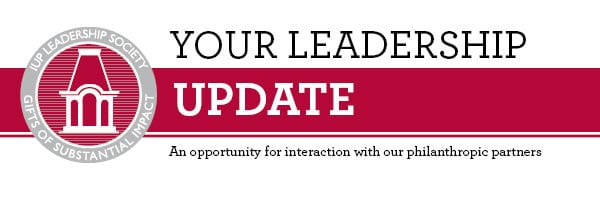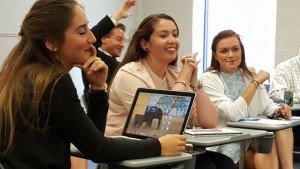Why should we care that Josiah Townsend found a new species of pit viper last summer?
I’ll admit it. Snakes terrify me, but I have an important reason to celebrate Dr. Townsend’s triumph. The American Association of Colleges and Universities has declared that in this century, all students must master the arts of inquiry and innovation. It recommends that all institutions increase the number of opportunities for students to work with faculty members and others on research.
And you wonder what this has to do with pit vipers, right?
When Dr. Townsend discovered that new species and 22 others, he was working in Honduras on a Fulbright grant, and he took along with him more than a dozen assistants who just happen to be IUP students.
Dr. Townsend is back in Honduras completing his research as part of the grant, but the students returned to IUP with fresh perspectives about their academic journey and benefited from an international experience that will fuel their résumés and their budding careers.
One of the advantages we brag about is that while we are in the company of Pitt, Penn State, and Temple on the statewide scene, our professors, unlike many of theirs, teach undergraduates and engage them in the research. IUP’s rating with Carnegie Classification of Higher Education Institutions bumps up to the second highest level of doctoral universities, if you examine that measure today, based on IUP’s research expenditures and the number of research doctoral degrees we award.
Imagine the value of uncovering a historical truth, as Ben Ford and Bill Chadwick’s students recently did. During the summer Archaeological Field School, the students excavated the village of Newport, an area near Blairsville that was thought to have been first inhabited in 1780. The students found 8,000-year-old artifacts that prove humans settled along the Conemaugh River much earlier than anyone knew.
What I’ve described to you scratches the surface of what is occurring across our campus. Eye-opening experiences like these are what set our undergraduate students apart, are what inspire them to aspire for more, and what put them on the inside track for graduate school and careers.
Now, match up those hands-on discoveries with traditional coursework and value-added credentials like our minor in Leadership and Teamwork or our new Living-Learning Certificate programs in Global Scholarship or Scientific Communication, and you have an undergraduate experience that is pretty tough to beat.
It’s right here at IUP.
As always, I appreciate your interest and support. If you have any questions or comments, please ask or share.


